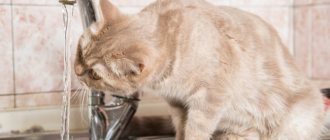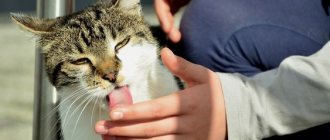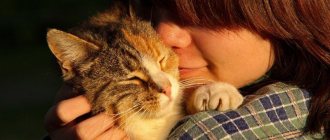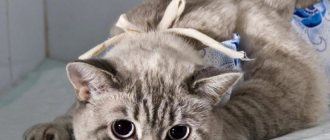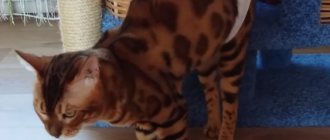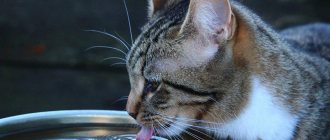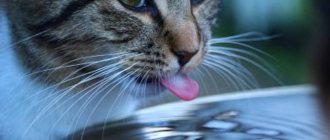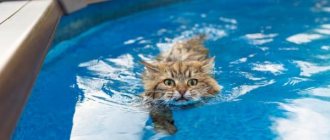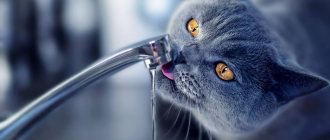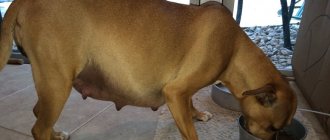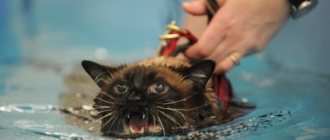- Posted by Ekaterina Gonina
- Date: November 11, 2018
Refusal of food and water for several days is a dangerous symptom, which in most cases indicates the presence of diseases of the internal organs. The greatest threat is posed by violation of the drinking regime. If an adult animal can go without food for 2–4 weeks, then in the absence of water dehydration and death quickly occur.
- 2 Signs of anorexia in cats
- 3 Should you contact a veterinarian?
3.1 Physiological norm
- 3.2 Dangerous condition
- 4.1 Table: diseases causing refusal of food and water
Causes of loss of appetite
A cat may refuse to eat for natural reasons, as well as due to illness. The most common of these include loss of appetite because:
- the animal was offended by the owner or other residents of the apartment and decided to express its protest in this way;
- if a cat often walks outside for a very long time, it can eat from neighbors or hunt birds or rodents;
- in the case when the pet lives in an apartment and leads a sedentary lifestyle, she is at risk of obesity, due to which she may lose her appetite as a result.
- a cat may also not eat well if it has temporary stomach problems;
- in the case when a pet has overeaten or consumed food that is difficult for him, he can also arrange fasting days for himself in terms of food intake and refuse everything;
- perhaps the cat is not eating because he has helminths;
- loss of appetite can also occur a week before or during heat;
- sometimes a pet refuses to eat after undergoing surgery using anesthesia, which inhibits all physiological processes;
- there is a foreign body in the pet’s stomach or mouth;
- Murka may starve due to stress. Cats are very sensitive to change. If you change your place of residence, make repairs, or even just move her bowl to a place she doesn’t like, she won’t eat.
First aid for a cat if it stops eating
If there is nothing unusual in the cat’s behavior, the owner should not take emergency measures. Most likely, the cat decided to relieve the gastrointestinal tract, obeying natural instincts. It is necessary to provide him with access to a sufficient amount of clean drinking water and periodically offer him food. He will decide for himself when it is time to return to his usual diet.
Be sure to read:
The cat eats poorly and is losing weight: causes, safe and dangerous symptoms, first aid, treatment
If the cat looks depressed, his whole appearance indicates malaise, there is vomiting, diarrhea, the temperature has risen above normal, or a hunger strike lasts 3 days or more, it is necessary to pay a visit to the clinic to exclude the possibility of a serious illness or to begin treatment as early as possible.
Be especially attentive to a pregnant woman
You should pay special attention to your pregnant pet. If a pregnant cat refuses to eat due to toxicosis or a couple of hours before giving birth, then this is quite normal and you should not worry if the fasting lasts no more than a day.
Also, if for the same period of time the cat refuses to eat after giving birth and still feels well, then there is no need to worry at all.
In this case, refusal to eat can be explained by the following reasons:
- a new mother is afraid to leave her newborn kittens;
- she ate more than two afterbirths;
- the cat is experiencing postpartum stress;
- The birth process was far from easy and Murka needs to regain her strength.
If the cat is lethargic and refuses to eat for more than a day, and at the same time its temperature rises, and a hard stomach is observed, then you urgently need to consult a specialist.
Signs of anorexia in cats
The key signs of anorexia are refusal to eat and rapid weight loss. In the true form of the disease, the animal completely loses interest in food and turns away from the bowl. With pseudoanorexia, the cat sniffs the food and may even taste it, but later spits out the pieces and leaves the same way.
To understand whether an animal is suffering from severe emaciation, you need to pay attention to the ribs, hips, shoulder blades and thoracic region: with significant weight loss, the bones protrude
When dehydration sets in, the animal becomes less active. In mild cases, it can look like fatigue after playing games. Later, the animal becomes passive and does not make contact.
There are 3 stages of dehydration: mild, moderate and severe. Fluid loss is up to 5%, from 6% to 10% and more than 10%, respectively.
Depending on the cause of anorexia, the syndrome may be accompanied by other symptoms. For example, with intestinal infections, diarrhea appears, and if internal organs are damaged, swelling and bleeding occur.
Dangerous loss of appetite for a small pet
Well, when you have a very small pet, who is only one to six weeks old, and he refuses food, then there is no need to hesitate. Such a pet should be given cow's milk to drink, since it is very nutritious and will bring more benefits to the young body than salty soup. Even if the baby categorically refuses milk, you should stand your ground, because for such a young body, starvation can be fatal , and you must solve this problem as quickly as possible.
Features of an elderly pet
Sometimes it happens that an older cat refuses to eat. In this case, you also shouldn’t panic right away; the older the animal gets, the less it moves and uses up its energy. Therefore, such a pet needs to be given less food and water than before. But even in this case, fasting should not last more than one day.
If you know that your pet has chronic diseases, then the problem of loss of appetite needs to be dealt with as quickly as possible, because this poses a serious threat to his body.
Before you panic, you should pay attention to whether you have changed the animal’s usual food for another food; if so, then try mixing a little of the old food with the new food . When the cat starts eating again, it means you are on the right track.
We recommend reading: Glycerin suppositories for children can be used for cats
If the cat suddenly begins to refuse even meat, then pay attention to his bowl. A pet may not eat food even when its bowl is dirty, so it must be kept clean and washed regularly.
If, nevertheless, your checks did not bring results and your pet has not eaten for several days, then you should definitely contact a veterinarian.
Also, an urgent reason for a visit to the doctor may be a lack of appetite, which is combined with a dry nose of the animal. After sleep, a pet's dry nose is not yet a sign of illness, but if it remains like this for a day or two, then there is already a reason for concern.
How to help your pet
The best help for your pet is to see a doctor. An exception may be situations when you are absolutely sure that such a condition is caused by stress. For example, a recent move to a new place of residence or the arrival of a new pet or family member. But even here your cat needs help. There are special medications that will help the animal calm down faster and enter the usual rhythm of life (for example, Kot Bayun infusion, collar or Feliway spray).
Feliway is a specially developed pheromone for cats that helps normalize the pet’s behavior in a stressful situation.
Before visiting the veterinarian
Before visiting the veterinarian, the owner can independently take measures to somehow alleviate the pet’s condition:
- Ensure peace and quiet, remove light irritants (dark windows).
- If possible, isolate from other pets (if there are any in the house) in case of an infectious disease.
- Place the pet on a clean bedding, not too soft, but comfortable.
- Place clean water and some of your favorite food next to your pet.
- You can force the cat to drink from a syringe without a needle (2-3 ml every half hour). This must be done if your pet has diarrhea or vomiting, or if the sick person is a kitten.
Drinking from a syringe is a necessary measure to prevent dehydration.
- If there is grass specially grown for your pet, offer it.
You cannot give any medications on your own without the advice of a veterinarian. They can smooth out the symptoms, and it will be more difficult for the doctor to understand the true cause of the cat’s ill health.
You can call your veterinarian by phone and get advice . He will not make a diagnosis over the phone, but he will be able to give some professional recommendations that can help the animal before arriving at the clinic.
I always have a piece of paper pinned with a magnet on my refrigerator with the veterinarian’s number (it’s also written into my phone’s contact book). I usually call to find out a convenient time to accept my pets (so as not to sit in line later). But one day I needed a consultation when the cat was vomiting (she was poisoned by something, as it turned out later, but we did not identify the exact source, because she was walking in the yard and could have eaten anything). The clinic was no longer open (it was evening), and over the phone the doctor advised me to feed the cat Enterosgel and forcefully give her water. This way we were able to hold out until the morning, when the cat was able to receive help at the clinic (including putting on an IV).
After receiving doctor's orders
After the veterinarian has made a diagnosis and prescribed treatment, you should strictly follow all his recommendations. Do not hesitate to clarify all the details regarding taking medications.
Never stop treating your pet before the time prescribed by your doctor, even if it seems to you that he has completely recovered. Infectious diseases require a full course of therapy.
Perhaps the doctor will advise changing the diet, making it more gentle on the pet’s gastrointestinal tract. Special lines of well-known brands of cat food may be suitable, for example:
- Gastro Intestinal from Royal Canin;
Royal Canin Gastro Intestinal - diet for cats with digestive disorders
- Vet Life Cat Gastrointestinal from Farmina;
- PRO PLAN Veterinary Diets EN Gastrointestinal;
- Hill's Prescription Diet Feline i/d.
Additional recommendations
Following these recommendations will help your cat recover faster:
- A calm environment will help your cat get out of stress. You should not force your pet into games and communication.
- If your pet refuses the new diet, go back to the old one. If this is not possible, look for other cat food options (some animals refuse certain brands, so trial and error is the only way to find the right food).
- Ecto- and endoparasites are destroyed using special preparations. There is no need to use them before visiting a doctor, but in the future it is always better to use them for prevention.
- Inflamed gums can be treated with a solution of chlorhexidine or manganese (faint pink). This procedure is carried out twice a day. A piece of gauze is soaked in a medicinal solution and gently pressed onto problem areas of the oral cavity without applying pressure. Depending on the affected area, you can also use cotton swabs, precisely treating the desired areas.
Mandatory specialist assistance
It should be remembered that no matter what age your pet is, if he does not eat for more than a day, then you should definitely contact a veterinarian and find out why the cat refuses to eat and, with his help, understand how to cope with this problem and return the pet to its former appetite .
After all, you can’t treat an animal if you don’t accurately diagnose it, and you can’t determine it yourself. Only a doctor can:
- conduct a competent examination of the animal (listen to it with a stethoscope, examine the oral cavity, palpate the abdomen, take the temperature and weigh the animal);
- do a blood and urine test;
- take an x-ray of the abdomen and chest;
- carry out a stool test for the presence of worms.
If your pet suddenly starts refusing to eat, then you should never turn a blind eye to it and hope that the problem will solve itself. You definitely need to do something to help your pet. You shouldn’t joke with your pet’s health, and remember, his life is in your hands.
A cat may refuse to eat for natural reasons, as well as due to illness. The most common of these include loss of appetite because:
What to do
A pet will not lose weight immediately, and therefore the owner may not notice the changes for a long time. As a result, the problem becomes obvious when the cat has lost a lot of weight.
The cat licks and swallows saliva: the main reasons
It is advisable to immediately show the cat to a veterinarian. If this cannot be done, then the animal is provided with a quiet and calm place. He may meow restlessly, then he can be given a light sedative “Cat Bayun” or “Stop-Stress”.
Do not try to force feed an animal. You can try offering another food, for example, baby meat puree. The owner should not rely on the condition of the nose. Even if it is wet, this is not an indicator of health.
You should immediately take your cat to the vet if the following symptoms occur:
- heat;
- loss of consciousness;
- apathy;
- frequent vomiting.
The veterinarian will examine the pet, do tests and prescribe treatment.
Important! In case of intestinal obstruction, urgent surgery is needed, since without it the animal will die.
And the Pregnant Cat Refuses to Eat and Burps
Home Questions and Answers Cats Breeding cats
Pregnancy is always a difficult period for a cat, because... Not every pregnancy goes well. It happens that a cat refuses to eat for no reason. Should the owner worry in this case and run to the doctor? Let's find out...
If a cat does not eat in the first half of pregnancy , then this may be: - toxicosis (pregnancy in cats is sometimes accompanied by the body’s rejection of embryos, just like in humans), - the cat may feel unwell if the embryos have died in the uterus, - the cat is sick any infectious disease (for example, infectious rhinotracheitis) - the cat was injured (for example, fell from a height).
If a cat refuses to eat in the second half of pregnancy , this may indicate: - late toxicosis, - death of fetuses and the onset of inflammation in the uterus, - any infectious disease (for example, panleukopenia), - any inflammatory process in the body (for example, inflammation of the pancreas) , - multiple pregnancy (many kittens in the uterus - the uterus takes up a lot of space in the abdominal cavity, and the stomach decreases in size), - polyhydramnios (a lot of amniotic fluid in the uterus - the uterus increases in size and does not allow the stomach to take food; at the same time, the cat internal swelling may begin), - constipation (the cat cannot go to the toilet for the most part; reverse absorption in the intestines begins and poisoning of the cat’s body).
Your actions: 1. If the cat does not eat at all and at the same time feels unwell, a doctor is urgently needed. 2. If the cat eats, but little by little, then put the food in a bowl for free access and start feeding it soft food. For example, jelly or cooked minced meat.
Remember that the key to the health of cats and kittens is the constant supervision of the expectant mother by your personal veterinarian. Especially if the cat is purebred and the kittens are needed for breeding and exhibitions.
Pregnancy is always a difficult period for a cat, because... Not every pregnancy goes well. It happens that a cat refuses to eat for no reason. Should the owner worry in this case and run to the doctor? Let's find out...
Pregnant cat refuses to eat!
Good afternoon ! I have a 1.5 year old British cat with vaccinations! Today is 49 days of pregnancy. For the third day he refuses to eat AT ALL! We were fed, as always, German canned food, Royal Canin dry food and raw frozen beef. She vomited white foam, then yellowish foam. no hairballs came out. No temperature. The veterinarian said to give Vaseline oil 0.5 ml every 2 hours until he goes to the toilet. They took blood to check for infections. The question is, can she take antibiotics?
Why does she need antibiotics? Give maintenance injections subcutaneously (glucose, etc.). Do a blood test (general), find out the cause. Pregnancy is not enough to stop eating, it is possible that it is a coincidence, and right now the cat is showing the results of experiments with diet. Before injecting antibiotics, make at least a tentative diagnosis, and then act.
Thank you! We went to another veterinarian and the doctor told us that during the shedding the fur had become thick! They prescribed, as you said, Glucose or Hemodez, Gamavit, and yet Gentamicin 0.3 ml per day, all subcutaneously.
Read about feeding here: https://www.allvet.ru/guide/kormlenie_cat/ https://www.allvet.ru/guide/kormlenie_cat/
It’s a little strange that it’s due to shedding, since Britons have short hair. Add grass to your cat's diet; you can also grow oats.
A paste for hair removal is usually recommended; I would like to know the doctor’s opinion on this matter. I tried giving it to my cat, but he immediately vomited, so I decided not to experiment.
Read about feeding here: https://www.allvet.ru/guide/kormlenie_cat/ https://www.allvet.ru/guide/kormlenie_cat/
The cat refuses to eat
Representatives of the cat family, including domestic cats, are predators. Their nature is such that they are ready to chew food that seems heavy at first glance. Cats' teeth are not designed for eating and chewing grass, but are designed to tear prey. Despite this, cats are quite selective in terms of food, absorbing food slowly and carefully.
Owners may be alarmed when a cat refuses to eat.
But not in all cases, refusal to eat should be regarded as an alarming symptom. For example, old animals are not willing to eat due to a sharp slowdown in metabolic processes in the body. The need for useful and nutritious substances decreases, so the cat stops eating normally.
Physiological reasons for refusal to eat include the period of impending birth in a cat. A pregnant animal refuses treats in preparation for an important moment. For several days after the birth process is completed, the pet may also refuse to eat, but drinks a lot.
Otherwise, a prolonged forced refusal to eat should be the reason for an immediate visit to the veterinarian to find out the reasons that led to the disorder in the food chain.
Environmental factors also influence an animal's appetite. Too hot a season provokes a decline in metabolic processes, the need for nutrients decreases, affecting the cat’s desire to eat.
How long can a cat normally go without eating?
- healthy adult - up to five days;
- up to six months - no more than a day;
- elderly cat - up to three days;
- cat after birth - one or two days;
- after surgery (anesthesia) - up to two days;
- pregnant woman - up to two days;
- animal with chronic diseases - no more than two days.
If the hunger strike continues longer, you should make every effort to feed the animal, offering it warm food and a favorite treat. Or contact a veterinary clinic for specialist help.
Main factors for food refusal
The reasons for a cat's refusal to eat are divided into physiological and pathological. Thus, physiological factors include the period of pregnancy, old age of the animal, high or low ambient temperatures, as well as monotonous nutrition.
A pet that is tired of the same type of food will begin to consume less, frightening its owner. At the same time, the animal drinks water as usual. If no other symptoms are observed, then the owner does not have to worry about the health of the animal.
There are a number of other reasons why a cat refuses to eat. They are caused by various disorders in the body and infections. The main reasons are:
- Pain syndrome and stress conditions. The nervous system of cats, or rather the hypothalamic-pituitary system, is designed in such a way that the animal can react sharply and sharply to an irritating factor, easily tolerates it, and in the future this does not affect the general condition of the pet. In the case of constant stressful or painful sensations, a malfunction of the nervous system occurs and entails the development of problems in digestion, behavior and the general condition of the body.
- Oral diseases . There are several pathological conditions that can cause a cat to refuse to eat. Among them are oligodontia (a genetic disease characterized by the absence of several pairs of teeth), tartar (formed in all animals and, during the process of growth, can cover the entire surface of the tooth, causing chronic inflammatory processes in the gums), dental caries (the process of tooth decay, causing acute pain ), various foreign bodies stuck in the oral cavity, diseases of the digestive system.
- Inflammation of the walls of the stomach and small intestine . The development of helminthic infestations in a cat’s intestines provokes the onset of inflammation, causing pain and refusal to eat. Another cause of the inflammatory process in the digestive system may be foreign bodies stuck in the mucous membranes of the intestinal tract. Gastritis of the uremic type is a secondary disease that occurs against the background of insufficiency of the renal structures. Disorders in the digestive system that provoke an animal’s refusal to eat can occur due to food allergies, disorders of the pancreas, or as a result of an unbalanced diet.
- Poisoning in cats . If a cat refuses food and water, then the cause of this behavior may be severe poisoning. Intoxication of the body with low-quality food, household chemicals, medicines, poisonous plants, manifests itself in the form of eruption of gastric contents, sudden refusal to eat food and water. Untimely assistance can lead to dehydration and even death.
- Viral infections . Dangerous diseases of viral etiology can cause a cat to refuse food and drink. Rotavirus infections, which mainly affect the respiratory tract and mucous membrane of the oral cavity, are manifested by such symptoms as nasal congestion (at the same time, the cat’s ability to distinguish odors practically disappears), body temperature rises, febrile states occur, accompanied by severe exhausting weakness, so the pet begins to refuse and from water.
- Diseases of the urinary system. The most dangerous disease among the ailments of the urinary system is chronic renal failure, which develops when the kidneys fail to function. Malfunctions occur due to disorders of the water-electrolyte and nitrogen balance in the animal’s body. Toxic substances are not removed from the body and begin to accumulate, causing poisoning. As a result of this, not only the animal’s appetite is disrupted, but also a general depression of all systems appears. The pet eats practically nothing, but begins to drink heavily, causing diarrhea and eruption of gastric contents. This condition is always accompanied by dehydration, severe lethargy, apathy and weight loss. Another disease is urolithiasis, which is characterized by the formation of stones in the kidneys, bladder or ureters. A severe degree of the disease is characterized by general malaise, refusal of food and water, frequent urge to urinate, and severe pain.
- Intestinal obstruction. When foreign bodies enter the digestive tract, as well as during tumor processes, hernias or volvulus, a complete stop or partial cessation of the movement of the food coma along the tract occurs. As a result of the development of the pathological process, the pet gradually begins to refuse its usual food, up to a complete cessation of food consumption. The general condition worsens, pain in the abdominal area appears, and vomiting increases.
Should I contact a veterinarian?
It is impossible to give a definite answer to this question. The owner should independently assess the pet’s condition and determine the advisability of treatment. If the refusal of food is partial, and the cat turns away from food, but eats its favorite treats, it is recommended to delay providing help. Perhaps it’s a matter of selectivity, which occurs for various reasons: from stress and bad mood to sexual desire.
Physiological norm
The norm may be partial or short-term complete refusal of food in the following cases:
- Recently had treatment or surgery. Aggressive medications can cause temporary (up to 2-3 days) weakness. This often happens after taking antibiotics, because they destroy the local microflora. To mitigate their effects and speed up recovery, pro- and prebiotics can be used.
- Vaccination was recently rescheduled. Most drugs contain weakened but living pathogens, to which the cat’s body independently develops immunity. This requires the mobilization of all internal resources, which causes partial or complete loss of appetite. Interest in water continues. Normally, a cat may refuse food for 1–2 days.
- The cat is having a fasting day. Some animals voluntarily refuse food every 2–3 months for up to 2 days. It is assumed that this is done instinctively to normalize the functioning of the gastrointestinal tract.
- The cat is pregnant or nursing kittens. Voluntary fasting may be associated with the imminent onset of labor or simple fatigue after the birth of babies. The cat drinks water but does not eat well for 1–2 days.
- The animal is in heat. During sexual heat, the reproductive instinct becomes the main one, so throughout the entire period the cat may eat poorly and lose weight.
Refusal to eat due to a runny nose due to colds does not require urgent correction. Subject to adequate treatment of the primary pathology, the nutritional schedule gradually normalizes. The same applies to hunger against the background of discomfort not associated with diseases. For example, a cat may go hungry due to stress after moving.
Dangerous condition
The threat is posed by refusal of water for 12 hours or more, as well as complete fasting for more than 3 days. Dehydration is more dangerous than exhaustion and occurs more quickly, so it is important to be able to correctly assess your pet’s well-being. This can be done using the following methods:
- Checking gums. It is necessary to quickly move the lip away and inspect the mucous membranes. Normally they are moist and shiny. When dehydrated, the body conserves moisture, so drying out occurs. An additional symptom is a feeling of stickiness in the gums. Drying occurs with moderate and severe degrees of dehydration. In such cases, urgent intervention is required. It is important to quickly assess the cat's condition, because upon contact with air, moisture quickly evaporates, which makes diagnosis difficult.
Normal gums should be pink in color.
- Skin pulling. You should carefully pinch the withers or skin. The second is preferable, because the skin on the withers is thicker and recovers more slowly, but this option is better suited for owners of aggressive animals. Once the fold is released, it should immediately smooth out. A slight delay may indicate mild dehydration. The danger comes from slowly smoothing the skin or maintaining the same position.
The grip and pull should be noticeable but not painful.
- Measurement of capillary refill rate. When dehydrated, blood volume decreases, it becomes more viscous, so its circulation slows down. To check, you need to lightly press on the animal’s gum, then release it and count the time until the color normalizes. The norm is 1–2 seconds. Delay occurs with severe dehydration, which requires urgent intervention. The most dangerous thing is pale gums even at rest.
To indirectly confirm the diagnosis, you can feel the animal's paw pads. If dehydrated, they will be cold. In the absence of other signs, a low temperature in itself does not indicate the presence of a deviation.
It is necessary to contact a veterinarian if there are any other specific symptoms: vomiting, weakness, reddening of the gums, etc. Additionally, a visit to the clinic is required if the animal is extremely exhausted.
If a kitten has lost its appetite, the possible fasting time is reduced to 4–12 hours, depending on age. If a six-month-old animal can maintain normal health when refusing food and water for 12 hours, then dehydration develops rapidly in a newborn baby. Sometimes only 4–6 hours are enough for death or irreversible changes to occur.
What is the danger of an animal refusing to eat for a long time?
A physiologically justified refusal to eat does not affect the general condition of the body. Being a predator by nature, a cat may refuse to feed for 3-5 days. This will not cause harm and will not affect the general condition of the animal. But only if the pet drinks water.
The age of the animal is also important. Scientists say that a healthy cat can live without water for up to 7 days. An older animal refuses to eat for several days and this will not harm its general condition. A cat with diagnosed chronic illnesses can go without food for up to 2 days.
It is especially worth noting that small kittens under 6 months of age can go without food for no more than 24 hours.
A longer hunger strike, accompanied by changes in the pet’s behavior, leads to the onset of degenerative processes within the body. The digestive system, liver and pancreas are the first to suffer. Changes also affect the kidney structures, heart muscle and brain.
